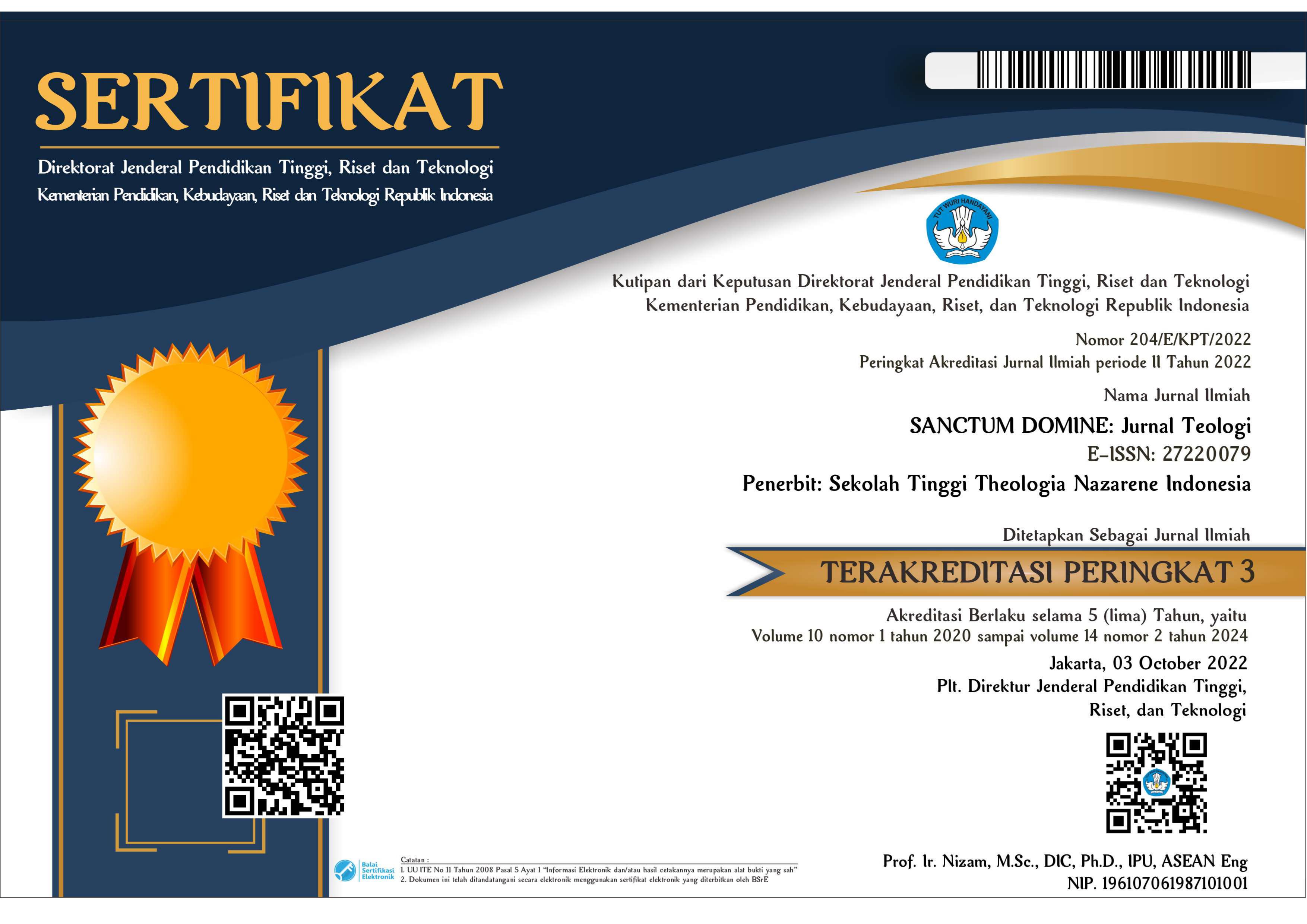Understanding the Responsibility of the Church for Urban Marginals Through Emmanuel Levinas' Thinking
Abstract
This study purpose to analyze the ethical responsibility of the church towards marginalized groups based on the ideas of Emmanuel Levinas. This research is qualitative-analytical using the library research method. This research shows that Emmanuel Levinas' thoughts regarding ethical responsibility can be a basis for the church to respond to the existence of marginalized people in urban areas. The ethical responsibility in question is the responsibility to maintain humanitarian actions, acknowledge their existence, provide attention and protect their rights as human beings. In this case, the church as an institution has a great ethical responsibility towards the marginalized, especially in the context of socio-economic justice.
References
Bourdieu, Pierre. Distinction A Social Critique Of Judgement Of Taste. Edited by Richard Nice. Cambridge: Harvard University Press, 1984.
Dwi C.P. Urbanisasi Dan Permasalahannya. Digital. Semarang: ALPIRIN, 2019.
Frans Magnis-Suseno. Pijar-Pijar Filsafat. Yogyakarta: Kanisius, 2005.
George Kunz. The Paradox of Power And Weakness: Levinas and an Alternative Paradigm for Psychology,. Albany: State University of New York Press, 1998.
Hadijah, Zara, and Mohammad Isnaini Sadali. “Pengaruh Urbanisasi Terhadap Penurunan Kemiskinan Di Indonesia.” Jurnal Wilayah dan Lingkungan 8, no. 3 (December 31, 2020): 290–306.
Harvey, David. Rebel Cities. from the Right to the City to the Right to the Urban Revolution. Eure. Vol. 40, 2014.
———. The Urban Roots Of Financial Crises: Reclaiming The City For Anti-Capitalist Struggle, n.d.
Levinas. Ethics and Infinity: Conversations with Philippe Nemo. Edited by Richard A. Cohen. Pittsburgh, PA: Duquesne University Press, 1985.
———. Face To Face With Emmanuel Levinas. Edited by Richard A. Cohen. Albany: State University of New York Press, 1986.
Pasurdi, Suparlan. Kemiskinan Di Perkotaan. 1st ed. Jakarta: Yayasan Obor Indonesia, 1993.
Perlman, Janice. Favela: Four Decades of Living on the Edge in Rio de Janeiro. New York: Oxford University Press, 2010.
Ricardo Freedom N. Gereja Sosial Menurut Konsep Rasionalitas Komunikatif Jurgen Habermas. Yogyakarta: Deepublish Publisher, 2020.
Setiawan, H. “Fenomena Gelandangan Pengemis Sebagai Dampak Disparitas Pembangunan Kawasan Urban Dan Rural Di Daerah Istimewa Yogyakarta.” Moderat: Jurnal Ilmiah Ilmu Pemerintahan 6, no. 2 (2020): 365. https://jurnal.unigal.ac.id/index.php/moderat/article/view/3218.
Sharon Todd. Levinas, Psychoanalysis, and Ethical Possibilities in Education. Albany: State University Of New York Press, 2003.
Sobon, Kosmas. “Etika Tanggung Jawab Emmanuel Levinas.” Jurnal Filsafat 28, no. 1 (February 28, 2018): 47.
Sugiyono. Memahami Penelitian Kualitatif. Bandung: CV. Alfabeta, 2005.
Suparyanto dan Rosad (2015. “Meneropong Ketimpangan Sosial Ekonomi Masyarakat Yahudi.” Stulos 5, no. 3 (2020): 94.
Thomas Hidya Tjaya. Enigma Wajah Orang Lain: Menggali Pemikiran Emmanuel Levinas. Jakarta: KPG, 2012.
Timotius. Gereja Yang Bertumbuh Dan Berkembang. Yogyakarta: ANDI, 2012.
Vika Azkiya Dihni. “Lebih Dari Seribu Gelandangan Berada Di Jakarta Pada 2020.” Databooks. Last modified 2021. Accessed April 14, 2023. https://katadata.co.id/. .
Copyright (c) 2023 SANCTUM DOMINE: JURNAL TEOLOGI

This work is licensed under a Creative Commons Attribution-NonCommercial-ShareAlike 4.0 International License.
Copyright:
SANCTUM DOMINE: Jurnal Teologi will validate, produce, disseminate, and act as steward in the long-term curation of every article published. In order to achieve this, the author typically requires a transfer or “assignment” of the copyright in the article. As is the case for open access publishing, the author (or copyright owner of the article, if different) signs an author publishing agreement. The agreement incorporates the necessary transfer of copyright.
After assigning copyright, the author will still retain the right to:
- Be credited as the author of the article.
- Own and exercise any trademark or patent rights held by author and addressed in the article.
- Make printed copies of the article to use for a lecture or class that the author leading on a non-commercial basis.
- Share the article with friends, colleagues and influential people the author would like to read the work.
- Present the article at a meeting or conference and distribute printed copies of the article on a non-commercial basis.
License:
This work is licensed under a Creative Commons Attribution-NonCommercial-ShareAlike 4.0 International License.
You are free to:
- Share — copy and redistribute the material in any medium or format
- Adapt — remix, transform, and build upon the material
- The licensor cannot revoke these freedoms as long as you follow the license terms.
Under the following terms:
- Attribution — You must give appropriate credit , provide a link to the license, and indicate if changes were made . You may do so in any reasonable manner, but not in any way that suggests the licensor endorses you or your use.
- NonCommercial — You may not use the material for commercial purposes .
- ShareAlike — If you remix, transform, or build upon the material, you must distribute your contributions under the same license as the original.
- No additional restrictions — You may not apply legal terms or technological measures that legally restrict others from doing anything the license permits.
Notices:
You do not have to comply with the license for elements of the material in the public domain or where your use is permitted by an applicable exception or limitation .
No warranties are given. The license may not give you all of the permissions necessary for your intended use. For example, other rights such as publicity, privacy, or moral rights may limit how you use the material.



8.png)









